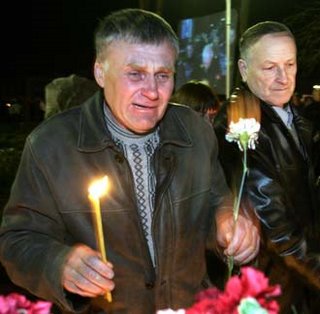Ukraine remembers Chernobyl

From the Globe & Mail, Wed. April 26, 2006
Ukraine remembers Chernobyl
ANNA MELNICHUK
Associated Press
Kiev — Bells tolled across Ukraine and mourners carried red carnations and flickering candles to commemorate the 20th anniversary of the Chernobyl nuclear explosion Wednesday, an event that continues to scar the psyche of the ex-Soviet republic.
The April 26, 1986, pre-dawn explosion, to be marked in Ukraine with daylong events, became the world's worst ever nuclear accident, spewing radiation across vast stretches of Europe. It cast a radioactive shadow over the health of millions of people; many believe it contributed to the Soviet Union's eventual collapse.
“My friends were dying under my eyes,” said Konstantyn Sokolov, 68, a former Chernobyl worker whose voice was hoarse from throat and lip cancer. Mr. Sokolov was among hundreds who gathered for a pre-dawn ceremony Wednesday in the Ukrainian capital, which President Viktor Yushchenko attended.
“I try not to recollect my memories,” Mr. Sokolov said as Orthodox priests led the mourners in a somber procession. “They are very terrible.”
In Kiev, bells tolled 20 times starting at 1:23 a.m., marking the exact time of the explosion at Reactor No. 4 at the Chernobyl nuclear power station.
Closer to Chernobyl in Slavutych — the town built to house the Chernobyl workers displaced by the accident — the commemorations began an hour earlier to coincide with Moscow time, which was used in the then-Soviet Republic of Ukraine at the time of the accident. Residents laid flowers and placed candles at a monument dedicated to Chernobyl as sirens blared.
Mykola Malyshev, 66, was working in the control room of Chernobyl's Reactor No. 1 at the time of the explosion. He said the lights flickered and the room shook. The workers were ordered to the destroyed reactor, but when they got there, their co-workers ordered them to flee and save themselves. “They told us, ‘We are already dead. Go away,'” Mr. Malyshev recalled at the Kiev ceremony.
The explosion tore off the plant's roof, spewing radioactive fallout for 10 days over 77,220 square miles of the then-Soviet Union and Europe.
At least 31 people died as a direct result of trying to keep the fire from spreading to the plant's three other operating reactors. One plant worker was killed instantly and his body has never been recovered. Twenty-nine rescuers, firefighters and plant workers died later from radiation poisoning and burns, and another person died of an apparent heart attack Death tolls connected to the blast remain hotly debated, as do the long-term health effects.
Thousands have been diagnosed with thyroid cancer, one of the only internationally accepted illnesses linked to Chernobyl, and the UN health agency said about 9,300 people were likely to die of cancers caused by radiation.
Some groups, however, including Greenpeace, have warned that death tolls could be 10 times higher and accused the UN of whitewashing the long-term effects of the accident in order to restore trust in the safety of atomic power.
Around 350,000 people were evacuated from their homes following the explosion, never to return. A whole city, Pripyat, and dozens of villages were left to decay, and experts say some may not be habitable again for centuries, perhaps even longer.
Some five million people live in areas covered by the radioactive fallout, in Ukraine, neighbouring Belarus and Russia.
Valentyna Abramovych, now 50, her husband and their infant son were forced to evacuate their home in the Chernobyl workers' city of Pripyat, leaving behind all their belongings. They were shuffled around, first to a nearby village then to a relative's house.
“Every day, I would watch television and expect to hear when we could come back,” Ms. Abramovych said. “When they said we could never come back, I burst into tears ... We feel like outcasts. No one needs us.”
Ukraine hosted competing scientific conferences on Tuesday as this nation of 47 million and the international community tried to make sense of the catastrophe.
Radiation and health experts from international bodies such as the International Atomic Energy Agency, the World Health Organization, the European Commission and the United Nations discussed what the world has learned from Chernobyl — and what it can do better to prevent a similar tragedy.
Some Ukrainians sought out more private places to remember.
“The whole country grieves and the whole world joins us in this grief,” Lena Makarova, 27, said as she visited the Chernobyl museum in Kiev.
· Print this article
· E-mail this article
· Join conversation (1)
http://www.theglobeandmail.com/servlet/story/RTGAM.20060426.wchernobyl0426/BNStory/International/home


